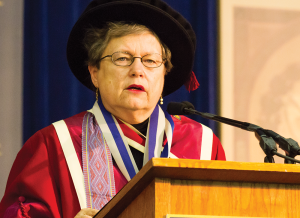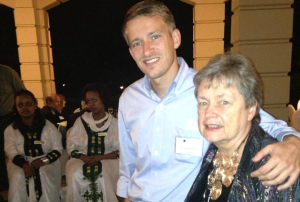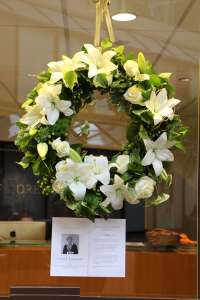
SFS Dean Carol Lancaster (SFS ’64) is remembered as integral to the SFS throughout the past half-century. Above: Lancaster speaking at commencement in 2013.
For over half a century, the School of Foreign Service and Carol Lancaster (SFS ’64) were intrinsically entwined. Among myriad notable alumni, Lancaster, who died Oct. 22 at the age of 72, shined as a dedicated public servant, academic and administrator who had an indelible impact on the school — and the world.
“Her passion for our university — for our students, their growth and our mission — was unparalleled, and we were all deeply fortunate to have had the chance to be in her presence. Carol will be missed in a most profound way by our entire Georgetown community,” University President John J. DeGioia wrote in a campus-wide email announcing her death Wednesday.
Lancaster resigned as dean of the School of Foreign Service in April, after taking a leave of absence following the discovery of a brain tumor in November 2013. Although doctors at the Georgetown University Medical Center removed the tumor in December, Lancaster entered hospice care in April.
“We were very grateful that we had as much time after her diagnosis as we did. She did fight this terribly, but it was a grim diagnosis from the start,” SFS Director of External Relations Gail Griffith (SFS ’72, GRD ’81), a friend of Lancaster’s, said. “I feel it was a great gift to have her as long as we did over the course of this summer, to spend time with her and have conversations with her that we treasure.”
After returning to the Hilltop nearly 20 years after her graduation from the SFS as a professor of politics in 1981, Lancaster would go on to serve as the director of the African Studies Program, the director of the Master of Science in Foreign Service Program and the director of the Mortara Center for International Studies, interspersed with a term as deputy director for the United States Agency for International Development during the Clinton Administration. She assumed the SFS deanship in 2010, after serving as interim dean the previous year. She was both the first woman and the first SFS graduate to serve as the school’s dean.
“Carol was this very energetic, imaginative, creative, forceful personality. And she really had multiple visions. She wanted to do so many things,” said Interim SFS Dean James Reardon-Anderson, who served as Lancaster’s senior associate dean. “She pursued them with great vigor and many of them really came to fruition and I think they are going to be with us for a very long time.”

Lancaster with her son, Doug Farrar (SFS ’05).
“A Washington Gal”
Lancaster was born in Washington, D.C., a city that would prove to be inextricable from her personal narrative. Coming from a family of humble means, she was encouraged by her counselor at Oxon Hill High School to apply to Georgetown.
Upon graduating with a Bachelor of Science in foreign service, she won a Fulbright fellowship to La Paz, Bolivia.
“I think when she was in Bolivia, she was affected by the poverty and the living situation. She had a contribution to make in that field,” Griffith said.
She went on to earn her masters and doctoral degrees from the London School of Economics, where she met her first husband, Mehdi Ali, an Iraqi.
“She spent a lot of time in the Middle East as a newlywed, getting to know his family and travelling around,” Griffith said.
In addition to acquiring Arabic, the polyglot Lancaster developed an interest in the Middle East and Africa, on top of her passion for Latin America.
She returned to the United States in the 1970s, assuming various roles in government, including in congressional offices and in the Department of State during the Carter Administration.
“Carol Lancaster is one of those people who epitomized excellence day after day in government and in academia. Working in Congress, in the State Department, in [USAID] or in the classroom, she demonstrated a hard-nosed, fact-based practicality that turns good intentions into good results,” former Rep. David Obey (D-Wisc.), in whose office Lancaster worked, said in a statement to The Hoya. “Few people in the general public knew her name, but she has been one of those people who gives public service a good name. I learned a lot from her and very much regret her passing.”
Lancaster was a member of the State Department’s policy planning staff in the late 1970s, before serving as deputy assistant secretary of state for Africa from 1980 to 1981. She left government to join the Georgetown faculty in 1981, and would serve as director of the African Studies program later that decade.
“She Had a Mission”
Lancaster’s expertise lay in developmental economics, and she authored 10 books primarily focused on foreign aid.
“Dean Lancaster was a giant, not only here at Georgetown and as dean of the School of Foreign Service and everything she did preceding that, but she was a giant in the field of economic development, and particularly, politics, political science and political economy of development around the world with a lot of her work in recent years in sub-Saharan Africa,” said Steven Radelet, the Donald F. McHenry Chair in Global Human Development and director of the Global Human Development program.
While Lancaster’s tenure as dean was truncated by illness, she had planned to step down upon her term’s expiry in the summer of 2015, having instituted profound change and expansion.
“I had a very interesting phone call with her. Sometime before she announced she wouldn’t have another term as dean, we talked about whether she was in a position to finish as dean and go back to scholarship,” said Robert Gallucci, a distinguished professor in the practice of diplomacy and Lancaster’s predecessor as SFS dean. “I assured her that her contributions were so many and so important that she had paid her dues and that she could indeed go back to scholarship. It was not long after that when she was diagnosed, which I think is a tragic irony.”
Most significantly, these “dues” included the establishment of the master’s program in global human development and the foundation of the Georgetown Institute for Women, Peace and Security.
“She had hoped for many, many years that Georgetown would play a leadership role in global women’s issues,” said GIWPS Executive Director Melanne Verveer (FLL ’66, GRD ’69), who as chief of staff for Hillary Rodham Clinton formed a friendship with then-USAID deputy director Lancaster. “She was hoping that it would be a place that would make a real contribution to advancing these issues in the world community, provide opportunities for research and related kinds of experience, create an academic program, that it would have a global platform that would put a focus on various aspects of women’s peace and security.”
Former Provost Jim O’Donnell said that the School of Foreign Service campus in Doha, Qatar, held a particular draw for Lancaster.
“The majority of our students in Doha are women from the Arab and Muslim world who have limited educational opportunities otherwise because their parents don’t want to send them abroad to study. And Carol was clearly very much animated and engaged by the opportunity we had there to provide the very best that Georgetown can do for some remarkably smart and promising young women,” he said.
Lancaster conceived and executed the Global Human Development program, aiming to train practitioners who would work on the ground in developing countries.
In April, the SFS Board of Visitors endowed the Carol Lancaster Scholarship to fund an entering graduate student in the GHD program. The board raised $128,000 in funds in “almost record time,” according to Griffith, the SFS director of external relations, and the first Lancaster scholar entered the program this semester.
In addition to these creations, Lancaster also oversaw the establishment of a master’s program in Asian Studies, in addition to more discreet administrative changes.
“It was mostly kind of hidden things that she did that meant a lot and mean a lot to this day and probably escape the attention of average people and sometimes faculty even aren’t aware of these things. She instituted regular consultations with the program directors. … In the past, that was always much more episodic,” SFS Faculty Chair Jeffrey Anderson, director of the BMW Center for German and European Studies, said. “She understood the complexities of this place; it’s a very decentralized place and that’s in many ways its strength but also you can imagine a decentralized place kind of flying apart over time, becoming less efficient, less connected. She has a knack for figuring out how to bring us together, even though we are all doing our own things within the school.”
Although Lancaster’s tenure as dean coincided with budget cuts as a result of the financial crisis, she maintained faculty growth, and the school continued to turn a profit.

A memorial at the SFS Dean’s Office this week.
“A Force of Nature”
The descriptors “energy,” “enthusiasm,” “passion” and “humor” were never absent from an account of the dean emerita.
“Carol was the dean of the SFS when I came, so in a real way, she taught me about the SFS and what its aspirations are and how it works and things like that,” said Provost Robert Groves, who joined Georgetown in August 2012. “As a new provost here, Carol was really wonderful in making me feel welcomed. She embodied the Georgetown spirit of community and care about the whole person instantly.”
Above all, Lancaster cherished her students, forming personal connections to both undergraduate and graduate students alike, facilitated by dinners and personal conversations.
“I think that oftentimes when you become part of a management team of a large and really highly respected program, you kind of lose touch with the individual students who make that program so special,” Lancaster’s son Doug Farrar (SFS ’05, GRD ’12) said. “I think that in her case she really maintained that personal connection and that intimate caring for her entire class of students through SFS. To me that was a major impact that I saw her have on students: that she really became close to these people and cared about their lives and their future beyond just in an academic setting.”
Farrar took a class co-taught by Lancaster and DeGioia on ethics in international development, two topics about which Lancaster was passionate.
“It was a large class and she — it was graded by TAs, so there was no conflict of interest there. And actually we had different last names so no one really knew that she was my mom except for my friends in my class,” Farrar said. “It was amazing to see her in her professional element, having mostly seen her as a mom. I think it reinforced the view that I had, which is that she was who she was, no matter whether she was teaching, parenting, being with friends. She had that same humorous personality and tremendous curiosity and intellect. And she brought that to every aspect of her life.”
Beyond the developing world, she also championed women at Georgetown, serving as a mentor to many and pushing for the advancement of women on the SFS faculty, colleagues said.
Her sense of humor was renowned, employed at various events and used to put visiting foreign delegations at ease.
“She would consistently point to us in the direction of comedy and politically engaged comedy,” said Davis Center for Performing Arts Artistic Director Derek Goldman, the co-director of the Laboratory for Global Performance and Politics, an initiative between the theater and performance studies department and the SFS. “And she really understood the medicine of laughter and the way that the campus — I think she saw a connection between what we were doing with the Lab and comedy and laughter, and the campus needed it.”
In addition to her duties as dean, Lancaster played the harp, fashioned jewelry and was working on three books, including a history of Washington, D.C. — a subject on which she taught a freshman proseminar — infused with her personal history. According to Griffith, a manuscript is complete, but its future is unclear.
Although Lancaster’s health was in rapid decline by this summer, she attended her son’s wedding in Dahlgren Chapel on July 26.
“The fact that she made it to my wedding was an incredible testament to her strength and resilience. And it was a really special moment for me and for my wife and for our family because it meant so much for me to have her there,” Farrar said.
Lancaster is survived by her husband of 34 years, Curt Farrar, son, four stepchildren, seven grandchildren and her daughter-in-law. In lieu of flowers, the family requests that donations be made to the American Brain Tumor Association. A memorial will be held in Gaston Hall on Oct. 26 at 3 p.m.














